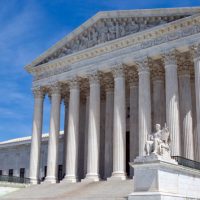
 iStock/Thinkstock(WASHINGTON) — President Donald Trump’s nearly yearlong effort to implement a ban on travel to the United States from countries deemed to pose a national security threat earned a victory at the Supreme Court Monday, where it was ruled the order could go into full effect as it continues to face legal challenges.
iStock/Thinkstock(WASHINGTON) — President Donald Trump’s nearly yearlong effort to implement a ban on travel to the United States from countries deemed to pose a national security threat earned a victory at the Supreme Court Monday, where it was ruled the order could go into full effect as it continues to face legal challenges.
The ban, now in its third iteration, currently covers travel from eight countries with varying restrictions ranging from the full suspension of both immigrant and non-immigrant entry, to restrictions on the uses of certain visas. The countries cited in Trump’s order are: Chad, Iran, Libya, North Korea, Somalia, Syria, Venezuela and Yemen.
The president issued the most recent travel ban in September. The first version of the ban encountered intense opposition and numerous successful legal challenges by critics of the administration who felt the first ban unfairly targeted majority-Muslim countries. The second version of the ban was permitted to go into limited effect in June after review by the Supreme Court, but key provisions only last for 90 and 120 days.
According to the government, the third version came after the Department of Homeland Security sent security and information-sharing requirements to foreign countries in July and identified the eight nations that neither met the requirements nor made improvements.
The Supreme Court’s unsigned ruling, issued Monday over the dissents of Justices Ruth Bader Ginsburg and Sonia Sotomayor, allows the ban to go into effect while appeals are heard by lower courts.
Copyright © 2017, ABC Radio. All rights reserved.















